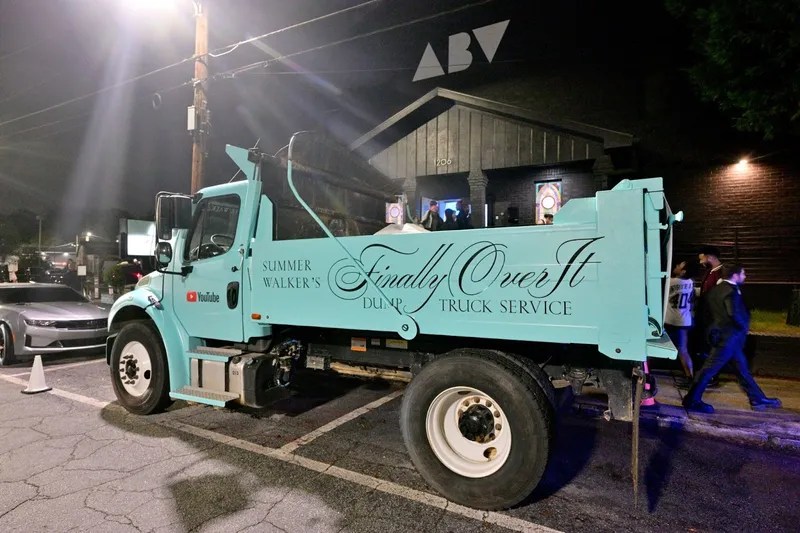The Summer Walker Dump Truck Tour made a major cultural splash in Atlanta as the R&B star kicked off her creative album rollout with a stop at the Atlanta University Center, drawing students from Morehouse College, Spelman College, and Clark Atlanta University into a moment that blended humor, heartbreak, charity, and HBCU culture.
Officially branded as the “Finally Over It Dump Truck Service,” the activation served as a promotional event for her new album Finally Over It while giving students a chance to throw away items from past relationships into an actual dump truck—a symbolic reset that resonated across the yard.
AUC outlet The Maroon Tiger reported that Walker partnered with YouTube to launch the tour, inviting students to “finally get over” their exes by donating gently used clothing and personal items. National coverage from platforms like HOT 97 and The Root highlighted how fans lined up at Morehouse to toss everything from hoodies to love letters into the truck, while Walker arrived in a sanitation-worker-inspired look, fully leaning into the theme of cleaning out emotional clutter. The concept fits squarely with Finally Over It, which drops November 14 and closes out her Over It album trilogy, a project described as a journey into healing and self-love in coverage of the album’s rollout. (The Maroon Tiger) The decision to bring the first Summer Walker Dump Truck

Why the Dump Truck Tour Resonates With HBCU Students
The Summer Walker Dump Truck Tour resonates so strongly with HBCU students because it transforms a standard album promo run into a shared emotional ritual that feels both playful and therapeutic. Instead of a basic meet-and-greet, Walker gave students a physical way to let go—literally tossing reminders of old relationships into the back of a mint-green dump truck, with all usable items donated to charity. YouTube’s official blog described the truck as a “donation mobile” rolling through Atlanta, noting that things escalated once Walker herself pulled up to Morehouse to help Spelman and Clark Atlanta students clear out the clutter from failed situationships. (blog.youtube) For HBCU students balancing class, campus life, and real-life relationships, the activation hit a nerve: it honored the drama, but centered healing.
Outlets like HOT 91.7 FM and The Jasmine Brand underscored how the tour invites fans to literally “toss their ex’s stuff,” turning heartbreak into community energy instead of private embarrassment. That mix of vulnerability, humor, and Black college culture is exactly why the Summer Walker Dump Truck Tour feels so tailor-made for HBCUs. It also reflects a bigger industry trend of artists choosing HBCU campuses for creative, experiential rollouts that feel authentic rather than transactional, a shift we’ve been tracking through stories in the HBCU Buzz news section as more entertainers and brands recognize the influence and storytelling power of Black college students.
What the Tour and Album Mean Going Forward
With the album Finally Over It now arriving as the third chapter in Walker’s Over It series, coverage from outlets and platforms like Wikipedia’s entry on the album notes that the project is divided into two sides—“For Better” and “For Worse”—reflecting both self-love and the honest fallout of relationships. (Wikipedia) The Summer Walker Dump Truck Tour activation at the AUC acts like a live extension of that concept, blending a cathartic purge with a celebration of moving on. While Atlanta and the AUC marked the first confirmed stop, fans are already watching to see whether Walker expands the tour to other cities or HBCU campuses, where similar activations could easily become campus legends. For the AUC, this moment reinforces its role as a cultural hub where artists come not just to perform, but to build experiences with students that tap into the emotional realities of young Black life.
For HBCU Buzz readers, the story of the Summer Walker Dump Truck Tour is bigger than an album stunt; it’s about how HBCU spaces continue to be where Black creativity, vulnerability, and community care collide—on the yard, in the city, and now, right behind a dump truck.

